
Silicon Valley, and technology and innovation more broadly, must play a role in moving the needle in global health. Prescription for Progress 2021 highlights how these partnerships can come together while connecting participants with one another so they can bring solutions to scale in the COVID-19 response and long-term recovery.
Sign up for Devex CheckUp
The must-read newsletter for exclusive global health news and insider insights.
3 p.m. EST — Closing remarks. "The idea that Prescription for Progress has — every year, it hits me more powerfully how important it is that we connect the huge trends in technology. Whether it is AI [artificial intelligence] or data science, tech is kind of everything now," says Devex President and Editor-in-Chief Raj Kumar. "And it has to be connected to global health if we want to bridge the gaps around the world today."
Right now is a "transformational moment," he adds.
We thank you for joining our third annual Prescription for Progress, hosted virtually for the first time. Though virtual events have their upsides and downsides, technology allows us to still convene and leverage established relationships with people all over the world, Devex Senior Reporter Catherine Cheney points out.
Though the event is over, the conversation will continue. Sign up for Devex CheckUp, our new global health newsletter. It launches March 11, exactly one year after the World Health Organization declared COVID-19 a pandemic. And check back later today for videos of all our public panels. — Tania Karas
2:56 p.m. EST — Marrying politics and partnership to support health systems and respond to crisis. The COVID-19 pandemic needs to be unpacked at every level, says Eric Goosby, a professor of medicine at University of California San Francisco’s School of Medicine. That includes looking at the ability for a “multilateral response to be orchestrated and concentrated effectively to bring needed resources [and] needed capability to those settings, countries, regions that did not get a good start.”
To effectively respond now, more regional and multilateral discussions are needed, and political bodies such as the G-7 and G-20 groups of nations have a critical role to play, he says.
Join us for a special Prescription for Progress ecosystem event on March 3 at 11 a.m. ET (5 p.m. CET).
“I think the COVID insult, if I could say it that way, has allowed us to look at the reality of what our relationships currently buy,” Goosby says. “Over the next three to six months, we’re going to see a different distribution of impact of COVID in sub-Saharan Africa, Southeast Asia, and now is the time for us to really galvanize partnership.”
The G-7 and G-20 need to recognize that health is a major issue and that “its solution is through a political vehicle” — so the health community and science experts need to be in closer dialogue with politicians, he says.
If donors commit to a vision in which partner countries are expected to manage and oversee health programs — with the understanding that donors will help expand their capabilities to do so over time — then when “new threats” emerge, that existing dialogue will be mature enough to “mount and alter response in real time,” Goosby says. He warns, though, that we are not there yet. — Adva Saldinger
2:41 p.m. EST — Kenya sets an example using technology to tackle NCDs. While there has been interruption in the health system as resources have remained focused on COVID-19, digital technologies have helped health systems create more resilience moving forward — especially toward the care of noncommunicable diseases.
With the help of Medtronic LABS, the Kenyan ministry of health is leveraging technology to identify, measure, and solve health issues across the NCDs.

Doing this requires a human-centric design that works with health care providers and patients so that from the beginning, "it is trying to solve a lot of the ground level barriers to care that we're seeing, not only from the clinician perspective … or the data custodian perspective, but also from the patient perspective," says Anne Stake, head of strategy, innovation, and technology, at Medtronic LABS.
However, funding remains a crucial gap.
"We have been talking about strengthening the finance for noncommunicable diseases, but unfortunately, it is not translating to results. In Kenya, only 2% to 3% of the exchequer funding comes to NCDs," says Zachary Ndegwa Muriuki, national program officer in the NCD division for Kenya’s health ministry. — Amruta Byatnal
2:26 p.m. EST — Breaking down silos between conservation and health. It is hard to overstate the ways humans are crowding out life on the planet, says Sam Myers, founding director of the Planetary Health Alliance, a consortium of organizations working to address the health impacts of global environmental change.

But the pandemic forces the connection between people, animals, and the planet into the spotlight. Tedros Adhanom Ghebreyesus, director-general at the World Health Organization, said that we can only prevent future pandemics with a “one health” approach.
Jonna Mazet, executive director at the One Health Institute at the University of California, Davis, speaks about her work leading PREDICT, an early warning pandemic system, as well as efforts to build a one health workforce globally.
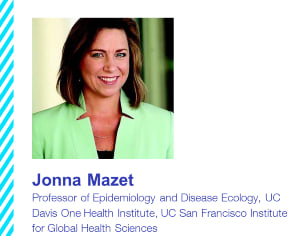
“I really do believe we have an incredible opportunity to recognize that the drivers for emerging diseases are the same drivers causing the degradation of our planet,” she says.
One venue for collaboration in the future is the Global Virome Project, an initiative focused on discovering zoonotic viral threats, Mazet says. — Catherine Cheney
2.06 p.m. EST — Partnering to advance progress on malaria, TB, and HIV. GlaxoSmithKline and Amref Health Africa announce a new partnership aimed at encouraging people to seek health care and supporting health care workers with the necessary tools for disease surveillance. This will be a two-year, community-driven program based in specific regions in Kenya and Ethiopia.
Pauline Williams, senior vice president and head of global health R&D at GSK, says the program is designed to be scaled to expand across regions and across diseases.
“We have seen some really nonobvious partnerships created through COVID-19 and let's build on those.”
— Pauline Williams, senior vice president and head of global health R&D, GSKDr. Githinji Gitahi, CEO at Amref Health Africa, says the project will help “to build robust cross-sectional and kind of horizontal changes to the health system to overcome the challenges that Malaria and TB bring to the communities.”
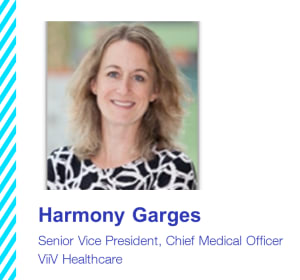
Speaking on the importance of partnerships, Dr. Harmony Garges, chief medical officer at ViiV Healthcare, says, “[O]ne company, one organization can not do it alone… [COVID-19] just really brought to light for the global community how important these partnerships can be.”
“We have seen some really nonobvious partnerships created through COVID-19 and let's build on those. Let’s really think about how we can work across sectors to really address public health challenges moving forward,” Williams adds. — Rumbi Chakamba
1:48 p.m. EST — What to expect from the ‘year of the vaccine.’ Peter Piot and Heidi Larson, both from the London School of Hygiene and Tropical Medicine, are urging the global health community to combine equitable distribution of COVID-19 vaccines with early community-level engagement to build trust and acceptance of immunization.

“If last year was the year of immediate control, this is the year of the vaccine,” says Larson, who is the founding director of the Vaccine Confidence Project. “If we don’t get that engagement going now, before these vaccines start rolling out, we’re going to miss a huge, important opportunity.”
Piot, known as a co-discoverer of the Ebola virus, cautions that while “we are getting to the end of the beginning” of the pandemic, the idea of ever getting to “zero COVID” is likely “an illusion.” Instead, global health leaders should be thinking about the “long-term strategy” for year-to-year management of COVID-19, at the same time they are “dealing with the crisis.” — Michael Igoe
1:32 p.m. EST — Using tech to help community health workers. The Smart Health app helps Diana Nakalema, a community health worker in Uganda, access all the information she needs as she goes door to door serving the needs of her community.
These digital tools have helped to ensure “the continuity of health care services delivery,” says Ruth Ngechu, deputy country director for Living Goods in Kenya, while also supporting “no touch protocols” for community health workers during the COVID-19 pandemic.
But these technologies are only as strong as the foundation of trust they rest on, says Darren Back, executive director at the Pfizer Foundation, which has supported Living Goods through its global health innovation grants.

He describes a visit to Uganda where he joined Nakalema to get a sense of her work: “It was so clear every community member did really value the trust and expertise of the community health workers and the advice they were giving.”
Back says it was key to consider how to play to their strengths, and that for community health workers, those strengths include not just the tech at their fingertips, but the trust they have earned in the communities they serve. — Catherine Cheney
1:03 p.m. EST — Closing the gap on global health equity. Are we getting it right when it comes to global health equity?
“Not yet,” says Loyce Pace, former president at the Global Health Council, and member of U.S. President Joe Biden’s COVID-19 advisory board. “We really need to ensure these vaccines, for example, are equitably distributed around the world, especially if we are going to really end this crisis but also do right by others.”
Conversations around decolonization, privilege, and power in the aid and development world have gained intensity over the last year, but these challenges stretch far beyond COVID-19, says Latanya Mapp Frett, CEO of the Global Fund for Women. But the pandemic has highlighted some of the deep inequities in global health. Reorienting development funding to directly reach the people most in need is one clear way forward to reduce inequity, she says.

“There are really no more excuses. The sector knows who needs the support and we know where to fund it. Some of it comes down to centering women and girls around the solution. The statistics show that grassroots gender justice organizations really are moving the needle,” Mapp Frett says.
Kennedy Mubaiwa, CEO of the Higherlife Foundation in Zimbabwe, also stresses the importance of embedded local partnerships and understanding of the communities any organization intends to support.
“We want to be in the communities that we work with,” Mubaiwa says. “We go where they are, we eat what they eat, we sleep where they sleep, we listen to them.” — Amy Lieberman
12:43 p.m. EST — The Trinity Challenge. Hala Audi, CEO of the Trinity Challenge, says her background working on antimicrobial resistance gives her a unique perspective on this effort to ensure the world is better prepared for future health emergencies.
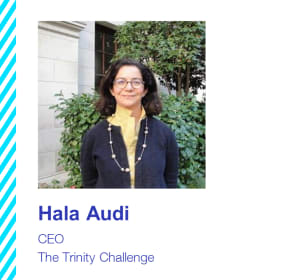
“It is simply cheaper and easier to act early,” she says, pointing to early intervention as the between her work on AMR and pandemic preparedness.
The Trinity Challenge, which is open for applications until April 15, is pooling the best ideas to identify, respond to, recover from outbreaks and epidemics. Audi describes the effort as “a coalition of members united to better protect the world against health emergencies using data-driven research and analytics.” — Catherine Cheney
12:38 p.m. EST — Mobilizing private sector investments in global health. Historically, there hasn’t been a lot of private investment in global health to create sustainable solutions. Instead, a lot of the funding comes in the form of aid, grants, and loans.
Some of the challenges around this include the commercial viability of health businesses, growing pains for health businesses that evolved from academia and don’t have proper business plans, and roadblocks with legal and regulatory structures, says Nafisa Jiwani, managing director of health initiatives at the U.S. International Development Finance Corp.
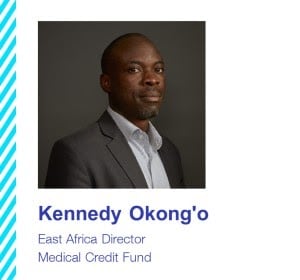
There are also challenges around the lack of government support for private small and medium enterprises in the health sector, says Kennedy Okong'o, East Africa director at the Medical Credit Fund. “A majority of the time, we will be left to worry about grants, and grants are quickly drying out the world over,” he says.
Development finance institutions should team up with large spenders in the health sector such as the Global Fund to Fight AIDS, Tuberculosis and Malaria and U.S. Agency for International Development, says Ben Hubbard, chief executive officer at Parsyl. “It’s really important that donors are not crowding out private sector and private capital,” he says. “The more they are creating market incentives, the more we are getting private actors into these sectors — we are going to have more of a sustainable financing structure.”
The role of insurance companies in low- and middle-income countries is also crucial, Hubbard says. Insurance companies bring in private capital, giving them “skin in the game” in the health sector, which helps to manage risk around these investments. — Sara Jerving
12:12 p.m. EST — Changing the pathways from product development to patients. The COVID-19 pandemic has shown the world the ability to speed up the development of treatments and vaccines. But apart from translating that to other global infectious diseases, the world also needs to change the approach it takes to get products to patients around the globe. Rajesh Gupta, who leads the global health portfolio at Vir Biotechnology, says this should be built on three principles:
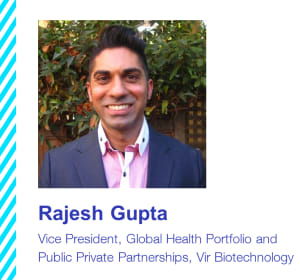
1. Financially empower low- and middle-income countries. The world needs a fully financed pandemic procurement fund in advance of the next pandemic, so lower-income countries are not left behind in supply allocations.
2. Develop critical operational solutions. This can be done by streamlining the regulatory process, expanding the global biologics manufacturing capacity for raw materials and finished products, and pilot testing in-country distribution of products.
3. Work on multiple innovations instead of waiting for the ideal technology. The world needs to understand that technologies need to evolve and be optimized to respond to things such as pathogen evolution.
Gupta also underscored the importance of having partnerships in place to deploy ready innovations to resource-limited settings. — Jenny Ravelo
12:08 p.m. EST — What’s WhatsApp learned from COVID-19? Nmachi Jidenma, strategy and business development lead at WhatsApp, shares three things the messaging app has learned through its work with WHO in the past year.
1. Keep it simple: Go to what’s already on people’s phones, and keep it simple and “delightful” to use.
2. Constantly iterate and learn: “With the pandemic there have been several needs. Initially it was just core information, over time we realized mental health was an issue … So [make sure] you are delivering that impact.”
3. Localize, localize, localize: Use the right languages and include the issues that people are looking for information about. — Vince Chadwick
11:43 a.m. EST — AI: An opportunity for health care. Artificial intelligence could transform the way the world thinks about health care — but there must be equitable access to the technology, says Dr. Ann Aerts, head of the Novartis Foundation.
“Countries with less resources have the most to gain from AI, but also most to lose if they lag behind,” Aerts says. “We have to transform our health systems and make them come from being that reactive health system — waiting for people to get sick before they do something — to become proactive, predictive, and eventually even preventative so that the health systems keep the population they serve healthy.”
“If you come with a well-intended solution that does not respond to a need on the ground, it will never get to scale. It has to be needs driven and having the people at the center.”
— Dr. Ann Aerts, head of the Novartis FoundationAI can help standardize care, assist providers in making more accurate diagnoses, and automate staff and resource planning. While accurate data and infrastructure — half of the world still isn’t connected, Aerts notes — are important, so is workforce expertise in the technology. AI must also target an existing problem, she says. — Teresa Welsh

11:30 a.m. EST — Leveraging technology's central role in COVID-19 response. Equity is a key element to consider when looking at the tech response to the coronavirus pandemic, panelists say. From digital thermometers uploading early cases to a cloud, to the developing new types of vaccines, health innovation must be accessible to all for it to be useful, the experts say.
“We need a global perspective … you have to have an underserved [community] strategy in every epidemic,” says Inder Singh, founder and CEO of Kinsa. He highlights how underserved communities had been disproportionately affected by COVID-19, and says it was “true in every single epidemic that has ever occurred. Technology is an enabling factor but we need those access programs and aggregation of data to be available.”
Jennifer Gardy, deputy director of surveillance, data, and epidemiology at the Bill & Melinda Gates Foundation, details her conditions for the equitable use of health care technology data to tackle future pandemics.
“Data needs to be a lot of things to be truly useful but two of those things are unbiased and accessible,” Gardy says, adding that those areas were “ripe for improvement in the global and public health space.”
“Inequity is a huge issue in COVID-19 and there’s some really important lessons to learn around how to really ensure that health data is being collected in a way that is capturing underlying disparities and is being used to plan interventions that address those disparities.” — Will Worley
10:30 a.m. EST — Prescription for Progress is due to start in half an hour. First up: technology's central role in COVID-19 response, with speakers from UNICEF, Kinsa, Bill & Melinda Gates Foundation, and Babyl Rwanda.
Update, Feb. 25, 2021: This article has been updated to correct the name of a speaker in the global health equity session.








